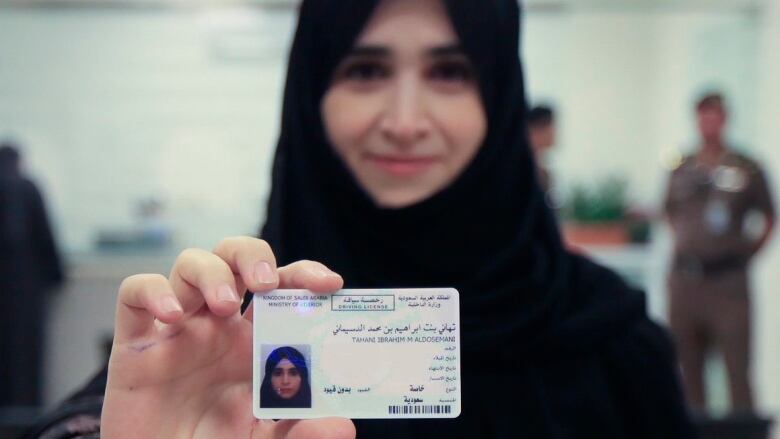1st Saudi women receive driver's licences amid crackdown
Canadian woman who campaigned for the right to drive has been detained since May 15

Saudi Arabia issued its firstdriver's licences to 10 women on Monday as the kingdom prepared tolift the world's only ban on women driving, but some women who campaignedfor the right to drive including a Canadianremain under arrest.
A government statement said the 10 women who were issued licencesalready held driving licences from other countries, including theU.S., U.K., Lebanon and Canada. They took a brief driving test andeye exam before being issued the licences at the General Departmentof Traffic in the capital, Riyadh. International media were notpresent for the event.
Other women across the country have been preparing for the rightto drive on June 24 by taking driving courses on female-only college campuses. Some are even training to become drivers for ride-hailingcompanies like Uber.
Saudi women had long complained of having to hire costly maledrivers, use taxis or rely on male relatives to get to work and runerrands.
5 men, 4 women in custody
The surprise move to issue some women licences early came asactivists who had campaigned for the right to drive remain underarrest, facing possible trial.
Saudi Arabia's prosecutor said Sunday that 17 people had beendetained in recent weeks on suspicion of trying to underminesecurity and stability, a case activists said targeted prominentwomen's rights campaigners.
The prosecutor's statement said eight have been temporarilyreleased, while five men and four women remain under arrest. Amongthe women held since May 15 are Loujain al-Hathloul, Aziza al-Yousefand Eman al-Nafjan, according to people with knowledge of thearrests who've spoken to The Associated Press on condition ofanonymity for fear of repercussions.
The three are among the most outspoken and well-known women'srights activists in Saudi Arabia. They not only pushed for the right to drive for years, but also called for an endto guardianship laws that give male relatives final say over a womanmarrying or travelling abroad.
Their activism was seen as part of a larger democratic and civilrights push in the kingdom.
They now face a range of charges, including communicating withpeople and organizations hostile to the kingdom and providingfinancial and moral support to hostile elements abroad. State-linkedmedia have referred to the group as "foreign embassy agents" andbranded them traitors.
Arrests 'perplexing'
Three other veteran women's rights activists were brieflydetained at the onset of the sweep. They had taken part in the firstprotest in 1990 against the kingdom's ban on women driving.
Nearly 50 women took part in that first driving protest some 28years ago. The women were arrested, lost their jobs, had theirpassports confiscated for a year and faced severe stigmatization.
Others were detained over the years during various efforts bywomen's rights activists to drive. While Saudi law has neverexplicitly banned women from driving, women were not issued driver's licences. Often, police would detain a female driver until a malerelative could pick her up and sign a pledge on her behalf that shewould not drive again.

Ultraconservatives viewed women driving as immoral and warnedwomen would be subject to sexual harassment if they drove. Just fouryears ago, the country's top cleric, Grand Mufti Abdulaziz AlSheikh, said barring women from driving "was in the best interestof society" because it protected them from having to deal with anaccident.
These days, the kingdom faces steep economic challenges and has aburgeoning young population that has access to the world through theinternet and sees women in neighbouring Muslim countries drivingfreely.
To boost the economy and ease international criticism, SaudiArabia's 32-year-old Crown Prince Mohammed bin Salman has beenpromoting changes, like the decision to allow women to drive, allwhile risking backlash from clerics and others who adhere to theultraconservative Wahhabi interpretation of Islam.
The prince has also attempted to appeal to young Saudis byopening the country to more entertainment, allowing music concertsand bringing the first commercial movie theatre to Saudi Arabia thisyear.
However, rights groups say the arrest of activists by the crownprince's security forces are an attempt to silence dissent as womenprepare to drive for the first time, and may be a way to freeze anycalls for greater reforms.
The spokesperson for the UNHigh Commissioner for Human Rights,Liz Throssell, has described the crackdown as "perplexing."
"If, as it appears, their detention is related solely to theirwork as human rights defenders and activists on women's issues, theyshould be released immediately," she said.












_(720p).jpg)


 OFFICIAL HD MUSIC VIDEO.jpg)
.jpg)



























































































